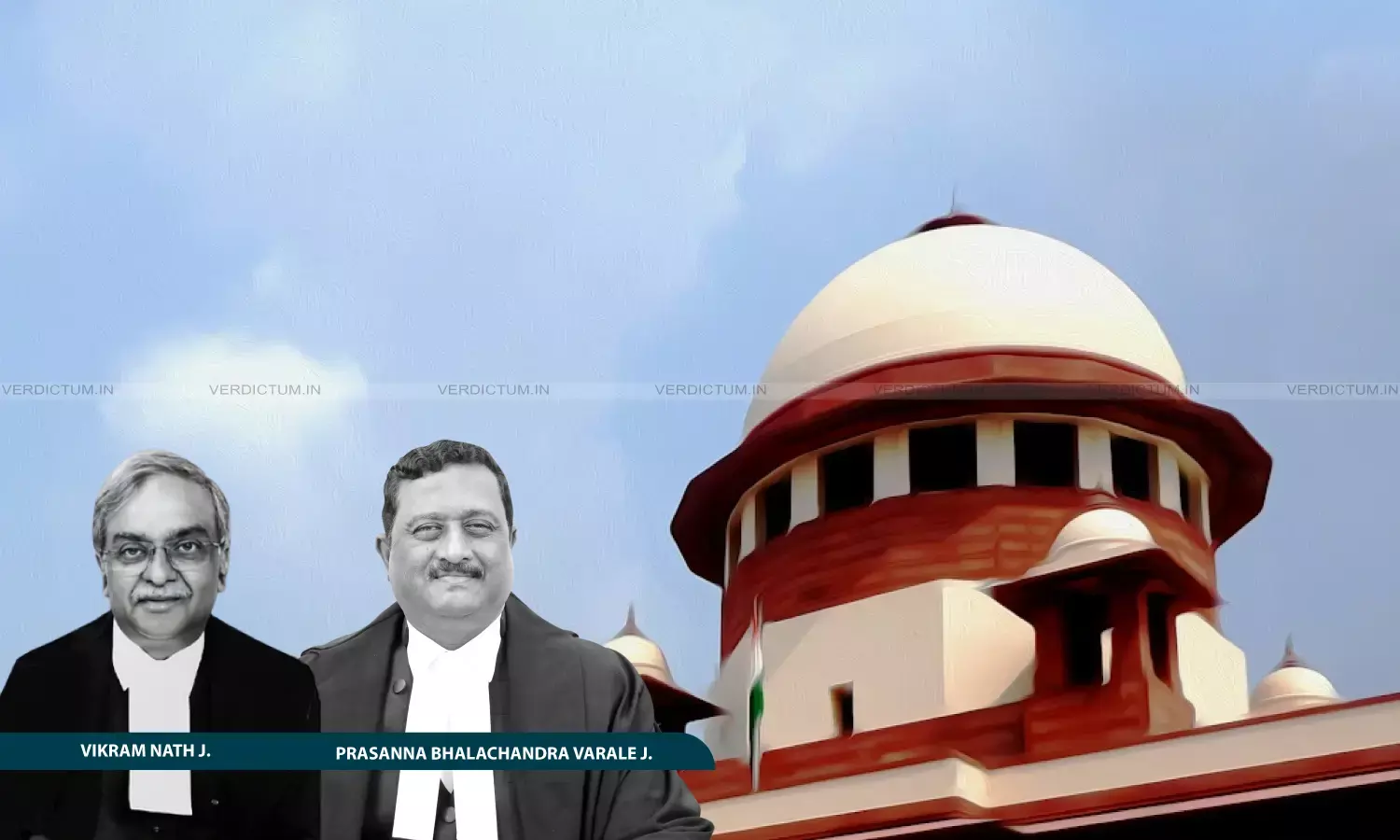Supreme Court: Judges Must Remember That Collegiality Is Companion Virtue Of Independence; Reversal On Appeal Not A Personal Affront
The Court said that the High Courts in India possess a wide jurisdiction, but the Supreme Court of India remains the final interpreter of law.

Justice Vikram Nath, Justice Prasanna B. Varale, Supreme Court
The Supreme Court has emphasized that Judges across our country must remember that collegiality is the companion virtue of independence and that a reversal on Appeal is not a personal affront but the ordinary operation of a constitutional hierarchy that corrects error and settles law.
The Court was deciding a batch of 96 Civil Appeals arising from the Judgment of the Bombay High Court, which declined to interfere with the revenue mutations and annotations that described the subject lands as affected by forest proceedings and as having vested in the State.
The two-Judge Bench comprising Justice Vikram Nath and Justice Prasanna B. Varale remarked, “Judges across our country must remember that collegiality is the companion virtue of independence and that a reversal on appeal is not a personal affront but the ordinary operation of a constitutional hierarchy that corrects error and settles law. Respect for the senior jurisdiction is not subservience. It is an acknowledgment that all courts pursue a common enterprise to do justice according to law. An Appellate Court reviews and, where necessary, sets right the decision of the lower court with restraint and measured language, and the courts below reciprocate through prompt, reasoned, and transparent compliance.”
The Bench said that the High Courts in India possess a wide jurisdiction, but the Supreme Court of India remains the final interpreter of law.
Senior Advocates Vineet Naik, Neeraj Kishan Kaul, Ajit Kumar Sinha, Vinay Navare, Aniruddha Joshi, Shyel Trehan, Abhishek Manu Singhvi, Anil Kaushik, C.U. Singh, Siddharth Bhatnagar, Prasenjit Keswani, Madhavi Divan, Guru Krishna Kumar, Atul Y Chitale, Sanjay R Hegde, and Gaurav Agrawal appeared for the Appellants, while Senior Advocates Balbir Singh and K. Parameshwwar appeared for the Respondents.
Court’s Observations
The Supreme Court after hearing the arguments from both sides, observed, “The judiciary draws its strength from discipline and not dominion. The Constitution of India creates courts of record that are independent in their spheres and yet binds them together through a coherent hierarchy. … Article 141 of the Constitution of India declares that the law laid down by this Court binds every court in the country. Further, Article 144 of the Constitution obliges all authorities, civil and judicial, to act in aid of this Court. These are not ceremonial recitals. They are the structural guarantees that convert dispersed adjudication into a single system that speaks with one voice and commands public confidence.”
The Court noted that appellate jurisdiction exists to correct errors and to settle the law so that like cases receive like outcomes and when a superior Court reverses, modifies, or remands, the Court below must give full and faithful effect to that disposition.
“The authority to decide on appeal carries the authority to require compliance, for without obedience, the hierarchy would become an empty form. Resistance or evasion does not merely disserve a party before the court, it erodes predictability, multiplies litigation, and weakens faith in the rule of law. The maxim “interest reipublicae ut sit finis litium” which literally means that it is in the public interest that litigation should come to an end, reminds us that the society has an interest in achieving finality, and finality from the apex court is the glue that holds a nationwide system of justice together”, it added.
The Court remarked that judicial discipline is the ethic that turns hierarchy into harmony and it requires courtesy, restraint, and obedience to binding precedent even where a Judge is personally unpersuaded.
“The lawful course is to apply the precedent and, if needed, record reasons for inviting a larger Bench to reconsider it. The unlawful and unjust course is to distinguish in name while disregarding in substance or to recast issues in order to sidestep a rule that binds. “Stare decisis et non quieta movere” which means to stand by decisions and not to disturb settled matters, is not a slogan but a safeguard of equality before the law. Judges do not sit to settle scores. The gavel is an instrument of reason and not a weapon of reprisal. A vindictive stance is incompatible with the oath to uphold the Constitution and the law”, it said.
The Court further observed that Courts speak through reasons, and reasons that align with binding authority preserve both legality and legitimacy of the judiciary.
“Articles 141 and 144 of the Constitution make obedience a constitutional duty and not a matter of personal preference. A judgment that attempts to resist binding authority undermines the unity of law, burdens litigants with avoidable expense and delay, and invites the perception that outcomes depend on the identity of the judge”, it also noted.
Furthermore, the Court said that in a constitutional judiciary, it is the law, as declared, that brings the conversation to a close. It restated the simple duty of Courts: apply precedent as it stands and give effect to appellate directions as they are framed and added that in that discipline lies the confidence of litigants and the credibility of Courts.
“In such circumstances the High Court could not, consistently with Article 141 of the Constitution, avoid the binding ratio by treating immaterial differences as determinative. In our opinion, fidelity to binding precedent and to the statutory scheme admits of no other conclusion than that the impugned order must be set aside”, it concluded.
Accordingly, the Apex Court allowed the Appeals, set aside the impugned Judgment, quashed the mutation orders, and directed corrections in the revenue records.
Cause Title- Rohan Vijay Nahar & Ors. v. The State of Maharashtra & Ors. (Neutral Citation: 2025 INSC 1296)


